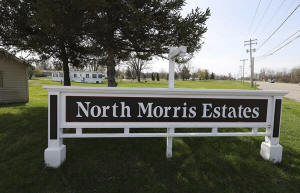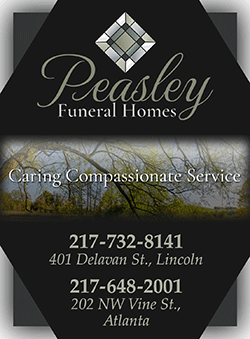Michigan led on safe water after Flint, but mobile home parks are
stubborn rough spot
[July 28, 2025]
By MICHAEL PHILLIS and TRAVIS LOLLER
After the Flint water crisis, Michigan became a national leader on safe
drinking water, requiring the removal of lead pipes and the reduction of
harmful “forever chemicals” years before the federal government acted.
But the state has a blind spot when it comes to the hundreds of
thousands of people who live in its mobile home parks.
Regulators say they have little power to enforce the rules in the
state's estimated 100 or more unlicensed parks when owners fail to
provide safe water. The problem is compounded by private equity firms
that have been buying up parks over the past two decades and now control
about 1 in every 6 parks in Michigan — among the highest rates in the
country, according to the Private Equity Stakeholder Project, a group
that advocates against such purchases.
Officials say it can be a struggle to even contact those park owners,
let alone get them to comply with regulations.
“With private equity moving into this space, the goal these companies
seem to have is to return the absolute highest return they can to
investors even if that means providing inadequate service or engaging in
exploitative practices, or unsafe practices for the residents,” said
state Sen. John Cherry, a Democrat who sponsored legislation to
strengthen enforcement in the communities.
But the state doesn't attempt to track unlicensed parks. And an industry
spokesperson said Michigan officials — particularly law enforcement —
have the power to do more if they choose.

Rare pursuit of an unlicensed mobile home park
At North Morris Estates where Theo Gantos lives outside Flint,
conditions got so bad that the state refused to renew the park’s license
to operate.
Water often flowed weakly from the tap because the wells that service
the park didn’t produce enough, Gantos said. Sometimes the water was
discolored. It could stain laundry and destroy appliances. He installed
a multistage filter system just to be able to use it.
Eventually, local law enforcement investigated. In March, the owner
pleaded guilty to a criminal charge for operating without a license,
agreeing to pay a fine and sell the park.
That might not have happened if Gantos had not been so pugnacious. He
spent years battling Homes of America, an affiliate of private equity
group Alden Global Capital that local prosecutors said owns North
Morris. That included filing a public records request for emails on
officials’ handling of problems at his park, pushing regulators to
enforce rules and speaking out to media over what he calls blight
conditions.
“These guys, they don’t care,” Gantos said about complying with the
rules.
Representatives of North Morris and Homes of America, including an
attorney who appeared for the park in legal proceedings, did not respond
to messages seeking comment.
The Michigan Department of Licensing and Regulatory Affairs, called
LARA, has the authority to inspect and investigate complaints at
licensed mobile home parks. But it’s typically fallen to law enforcement
to pursue criminal charges against unlicensed parks.
The North Morris conviction for operating without a license is likely
the first such under the state’s mobile home law that has been on the
books since 1987, the county prosecutor said.
John Lindley, president and CEO of the industry group Michigan
Manufactured Housing Association, said the rarity of such cases is
evidence that state and local law enforcement are choosing not to
enforce the rules.
[to top of second column]
|

Theo Gantos' neighborhood in the North Morris Estates mobile home
park is visible, Thursday, April 24, 2025, in Genesee County, Mich.
(AP Photo/Carlos Osorio)
 “This whole notion that, ‘There’s
nothing we can do about this.’ Clearly there is, or that prosecution
wouldn’t have taken place,” Lindley said. “Not having the authority
to go after communities that don’t have a license is completely
different from choosing not to go after those. And what we’ve seen
so far with both the state and local units of government is they’ve
elected not to.”
Shutting down a park is a bad option
Mobile home parks without a license are “essentially operating
unregulated,” Cherry said. One of the state’s few options is to shut
down a park, a rarely used last resort that can mean throwing people
out of their homes.
Mobile home parks have long been an important affordable housing
option. But that affordability is fading.
A study by Lending Tree, a lending marketplace, found new mobile
home sale prices rose more than 50% nationally from 2018 to 2023 —
new single-family home price averages, by contrast, rose 38% over
that period.
Last year, LARA supported legislation that would have given the
department more power to penalize unlicensed parks, force parks to
provide owner contact information and limit rent increases. That
failed.
This year, Democratic Sen. Jeff Irwin has proposed a narrower law
that would give state drinking water officials more power to make
sure water in all mobile home parks is drinkable. Right now, they
only have direct authority over parks that provide their own water.
But it’s common for parks to take city water from a pipe connecting
to the nearby town.
That water is usually safe when it reaches the park, but if the
park’s water pipes crack or fail, water protections won’t apply on
the private property. That keeps officials from stepping in and
forcing change except in limited situations when there’s a public
health threat. It can leave residents unsure where to turn when the
owner refuses to fix problems.

“We take those issues very seriously,” said Eric Oswald, director of
the Michigan Department of Environment, Great Lakes and Energy’s
drinking water and environmental health division. He said they try
to work with licensing officials to ensure water is safe, though
“the problem is, I’m not resourced for that.”
The Michigan Manufactured Housing Association opposed last year’s
legislation, arguing it would make mobile homes less affordable. The
group says it supports extending water protections to within parks,
as called for in this year’s legislation. It passed the state Senate
in late June and is now in the GOP-controlled House.
All contents © copyright 2025 Associated Press. All rights reserved |